Compiled by Rachel Mintz, Communications Intern, Global Ties U.S.
Global Ties Network community partners work to promote diversity, equity, inclusion, and accessibility (DEIA) efforts in their International Visitor Leadership Program (IVLP) projects. The World Affairs Council of New Hampshire highlights advocacy efforts to make civic engagement more inclusive for electors with disabilities, Global Ties ABQ reflects on how the arts promote social change, the International Visitor Council of Los Angeles shares a project on advancing religious tolerance, and the Cleveland Council on World Affairs and GlobalPittsburgh discuss projects supporting women in business.
Advancing Disability Inclusive Democracy
CBM: World Affairs Council of New Hampshire
NPA: Mississippi Consortium for International Development
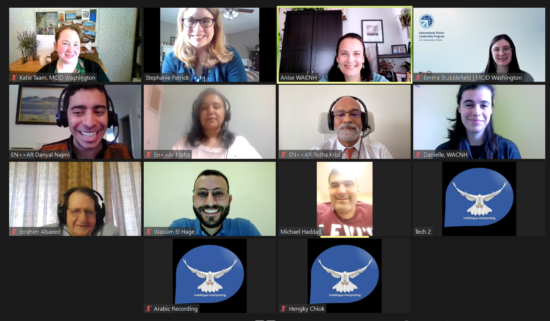
The World Affairs Council of New Hampshire hosted the virtual project for a group of people from Lebanon. Photo provided by the World Affairs Council of New Hampshire.
In April, the World Affairs Council of New Hampshire had the pleasure of hosting the virtual project titled “Advancing Disability Inclusive Democracy” for an extraordinary group of people from Lebanon. The group, made up of individuals who promote acceptance and inclusion for persons with disabilities, had the opportunity to meet with three resources. The group first met with the Disability Rights Center of New Hampshire, where they learned more about how this nonprofit provides legal services to people with disabilities when they feel they have been denied something based on their disability. They also met with Granite State Independent Living and learned about their advocacy efforts in relation to a lawsuit alleging election discrimination against electors with disabilities. Next, the group met with the New Hampshire State Secretariat, which handles voting in the state. They learned that the one4all voting system helps make the voting process more accessible, but the process is only used in a handful of places. Unfortunately, not everyone in the community has access to this system. While New Hampshire continues to work towards a truly accessible voting system for all its residents, we still have a long way to go.
As a Network, we have worked to enhance diversity, equity, inclusion, and accessibility in our programming. One positive outcome of the pandemic has been the adaptation of Zoom meetings into the International Visitor Leadership Program, which has helped us to be more accessible and inclusive. This project highlights that more than anything. Each of our guests had their own disabilities, some of which may have prevented them from physically coming to the United States. But by using Zoom we were able to provide an environment where they felt included and heard and were able to contribute to the exchange.
– Anise Jasman-Sayers, International Visitor Program Director
Dialogue with Mosques and Imams on Promoting Community Development and Religious Tolerance
CBM: International Visitors Council of Los Angeles
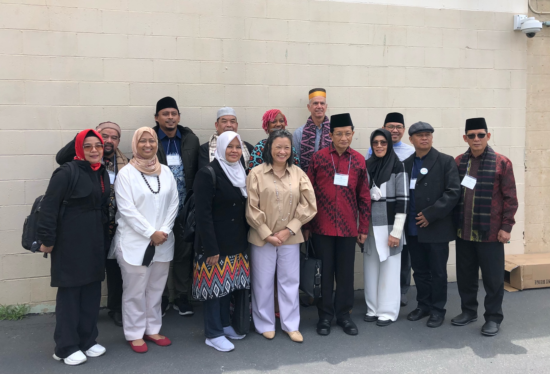
The visitors met with religious leaders to see how they are addressing the needs within their communities and are broadening tolerance and strengthening civil society. Photo provided by the International Visitors Council of Los Angeles.
Religious persecution is an international issue; improving cooperation and collaboration is crucial to raising awareness for religious minorities and improving religious institutions and leaders’ engagement in civic services. From May 14 to May 18, the International Visitors Council of Los Angeles welcomed a group from Indonesia to discuss this topic. The participants were visiting for the project “Dialogue with Mosques and Imams on Promoting Community Development and Religious Tolerance.”
While in Los Angeles the visitors were given the opportunity to see how the religious leaders and organizations in Los Angeles are addressing the needs within their communities and are cooperating across lines of faith to broaden tolerance and strengthen civil society. During a dinner hosted by the Iranian American Muslim Association of North America (IMAN) Foundation and Cultural Center, participants learned from CEO, President, Chairman, and Founder Sadegh Namazikah, Ph.D. IMAN is a nonprofit organization dedicated to promoting cooperation and affiliation within the Iranian and Muslim Community and among people of all races and religions. As an interfaith group, IMAN advocates for religious tolerance among the Muslim and Iranian community in Los Angeles while promoting Iranian culture and heritage and fostering Islamic values through social service to the community.
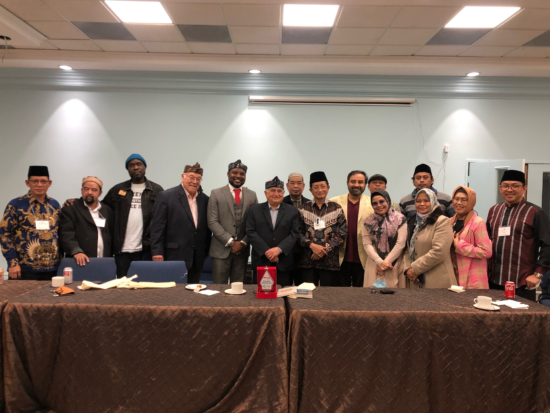
The visitors had dinner with the Iranian American Muslim Association of North America (IMAN) Foundation and Cultural Center. Photo provided by the International Visitors Council of Los Angeles.
From the academic perspective, visitors learned ways to implement the study of tradition in promoting religious tolerance within interfaith communities and addressing social needs. The USC Center for Religion and Civic Culture (CRCC) and the American Muslim Civic Leadership Institute (AMCLI) gave a perfect demonstration of the intersection between religion and civic engagement. CRCC aims to advance the understanding of religion and society and works to support faith and community leaders’ commitment to social change. AMCLI offers training to American Muslim leaders who are committed to civic engagement. Academic programming within religious organizations and fields combines tradition with interfaith activism to improve the community and offer social advancements. This program fostered understanding and promoted interfaith dialogue globally while building positive working relationships between our international visitors and Angelenos.
– Eleanor Hofmeister Alberg, Communications & Events Coordinator
WEAmericas Program: Supporting Women Entrepreneurs
NPA: American Councils on International Education
CBM: Cleveland Council on World Affairs
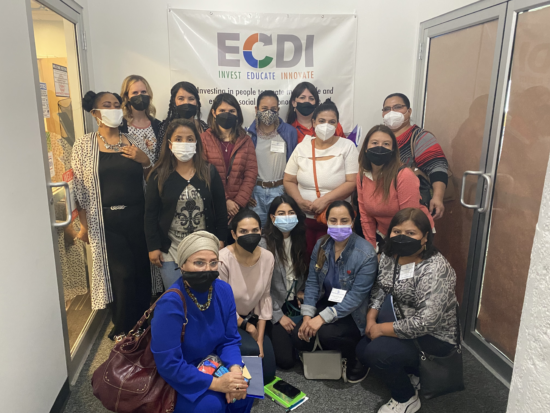
The IVLP group examined public-private partnerships, business development, media initiatives, networking groups, and education and mentorship support for women entrepreneurs while in Cleveland. Photo provided by the Cleveland Council on World Affairs.
In May of 2022, the Cleveland Council on World Affairs hosted a group of 14 inspiring women from North, Central, and South America through an International Visitors Leadership Program (IVLP) project titled “WEAmericas Program: Supporting Women Entrepreneurs,” in collaboration with American Council on International Education. The Cleveland portion of the project examined public-private partnerships, business development, media initiatives, networking groups, and education and mentorship support for women entrepreneurs.
During their time in Cleveland, the group met with several organizations that focused on building entrepreneurship and giving women the tools, resources, and support they need to overcome barriers and pursue their business ideas. The sessions stood out to me for being collaborative and inspiring.
One particularly inspiring session was with the Women Business Center of Ohio, an organization whose mission is to eliminate the obstacles women face in the world of business by providing women with resources, training, and access to capital. This meeting stood out not only for the great work the Center is doing in the Cleveland community but because of the support systems and connections made between the participants and speakers at the Center. This meeting truly embodied the power of women supporting women. By the end of the meeting, the speakers and international visitors were making plans to connect one-on-one to exchange ideas and resources and collaborate on future online workshops to bring the content back to their home communities and to engage the Hispanic community in Cleveland. These women took an hour and a half of in-person meetings and turned them into future partnerships. I was amazed by their passion and willingness to help one another.
Another inspiring site visit took place at the Cuyahoga Community College Women in Transition Program, which focuses on “helping women move their lives forward as they develop personalized plans focused on academic or professional development.” The group had in-depth conversations about what it would mean to start a program like this back home and how to help women build that support and mindset to transition into the next chapter of their lives, whether that is going back to school or building their own business.
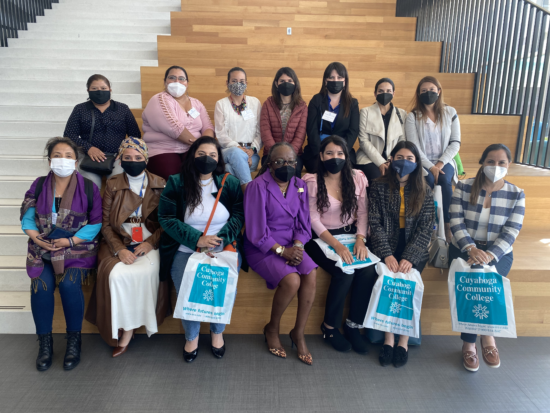
The women visited the Cuyahoga Community College Women in Transition Program. Photo provided by the Cleveland Council on World Affairs.
This in-person project showed me how important the introductions we make through exchanges can be and reinforced the power of women helping women in communities at home and abroad. It was an honor to host this wonderful group and I hope the connections they made in Cleveland help strengthen their communities back home.
– Maria Garcia-Olalla, International Visitor Program Associate
CBM: GlobalPittsburgh
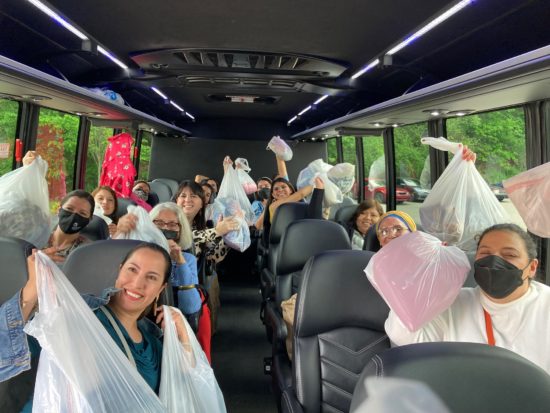
The visitors show their shopping bags in support of Treasure House Fashions. Photo provided by GlobalPittsburgh.
GlobalPittsburgh’s experience in hosting the “WEAmericas Program: Supporting Women Entrepreneurs” project from May 19 – 23 enabled a diverse group of women in our region to meet 13 remarkable women from Bolivia, Brazil, Chile, Colombia, El Salvador, Honduras, Mexico, Nicaragua, and Peru. GlobalPittsburgh worked in collaboration with American Councils for International Education on the project. The four interpreters accompanying the group – Maria Barrenechea, Liliana Ravioly, Sydney Kaiserman, and Susana Martin – greatly contributed to the program’s success and the group’s level of enthusiasm.
I joined the group for a moving meeting with Sally Power, Executive Director of Treasure House Fashions, a social enterprise focusing on women in transition or crisis. Following a tour of the store and its prep areas, Sally shared how her personal experiences, faith, sheer determination to overcome daunting challenges, and openness to learn from others led her on the path to helping other women facing adversity. After her presentation, every woman in the group took a few minutes to speak with Sally and thank her for sharing her story. Treasure House Fashions gave each woman a gift certificate to shop in the store under the inspiring words: “She Believed She Could…So She Did!”
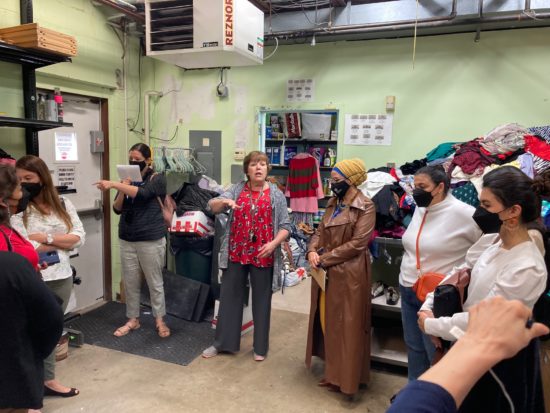
Visitors at the Sally Power Center. Photo provided by GlobalPittsburgh.
The group’s meeting with Emily Keebler, Kiva Pittsburgh Program Director, enabled them to learn about how women’s businesses may benefit from funds raised through crowdsourcing and how Kiva is funding businesses in the women’s home countries. A Saturday morning meeting with Frankie Harris at the boutique operated by the Ujamaa Collective was inspiring because it gave the women a successful working model of how women on different continents may work together to offer unique products and draw customers. A meeting with Anne Schlicht, Director of the Center for Women’s Entrepreneurship at Chatham University, provided the participants with insights into the value of mentoring to help women entrepreneurs succeed and a tour of the Center’s incubator facilities.
The women in the group connected with their Pittsburgh peers, with shared experiences and empathy for the challenges that many women face starting their own businesses and competing in the workplace while facing the challenges of achieving a work-life balance. The project exceeded our expectations.
– Gail Shrott, Executive Director
Promoting Social Change through the Arts, An Inter-Regional Project
CBM: Global Ties ABQ
NPA: FHI360
The International Visitor Leadership Program project “Promoting Social Change through the Arts” was an amazing opportunity to use the tools of the virtual world to connect global leaders with local leaders. Our inter-regional group attended a discussion panel, which included the Harwood Arts Center, located in Albuquerque, and Mentor to Market, located in Santa Fe, New Mexico. At Harwood, the group exchanged best practices with Helen Juliet Atkins, an artist, curator, and arts administrator whose work often focuses on the intersection of art and social justice. She is currently the Associate Director of Opportunity at the Harwood Art Center, helping to curate their Gallery & Exhibition Programs and lead their summer Apprenticeship for Art & Social Justice. The various threads of her career are pulled together by a common goal of nourishing her creative community and dismantling hierarchical norms—inviting participation, input, and leadership from an ecosystem of artists, activists, and community members. The group was very active and participated in an interactive discussion with Atkins and the other speakers.
I believe in the personal, intimate power of in-person programming. Although we all enjoyed the world of virtual programming, each in-person visit, meeting, and meal holds a special place in people’s memories and hearts. Exchange matters. We are gathering the world in our local communities again, which is why highlighting the diversity of our communities matters more than ever. Through these exchanges, we are better able to connect with our local and global communities.
– Sila Avcil, Program Manager
